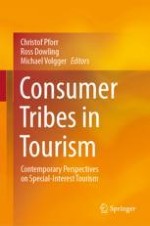2021 | OriginalPaper | Chapter
17. Tribes in Tourism: A Socio-Cultural Perspective on Special Interest Tourism Consumption
Authors : Michael Volgger, Christof Pforr, Ross Dowling
Published in: Consumer Tribes in Tourism
Publisher: Springer Singapore
Activate our intelligent search to find suitable subject content or patents.
Select sections of text to find matching patents with Artificial Intelligence. powered by
Select sections of text to find additional relevant content using AI-assisted search. powered by
